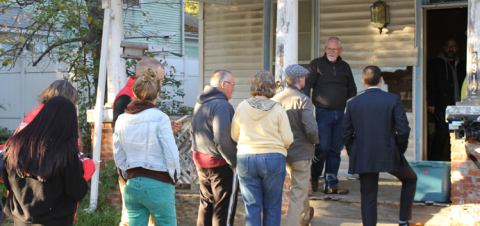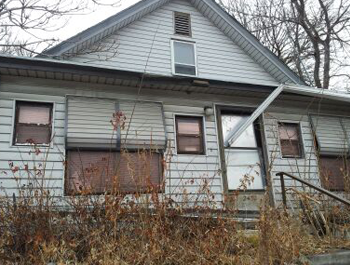Image

Patricia Anderson-Sifuentez, Community Builder, NeighborWorks Lincoln
Challenge: Many homes in the oldest neighborhoods in Lincoln, Nebraska were converted to poorly maintained apartments. Some residents wanted to preserve the old homes and crumbling neighborhoods, but building an effective coalition to effect change in the highly diverse community, where 90 percent of the properties were rentals proved daunting.
Lincoln, Nebraska has many beautiful old homes, some dating back 100 years or more. But as people moved from the city center, their homes were converted to rental properties, stripping them of their historic character and filling the neighborhoods with poorly maintained buildings. The change brought a severe increase in density, poor maintenance, crumbling infrastructure and a decline in the community's quality of life. Some stalwart residents loved the old homes in the urban center, as well as the close proximity to the city, the walkability and history. In the 1970s and 80s, residents started organizing to revitalize the neighborhoods. Unfortunately, those efforts proved an uphill battle.
NeighborWorks Lincoln (NWL) was founded 30 years ago, with a mission "to keep Lincoln safe and prosperous by revitalizing neighborhoods and promoting homeownership." The organization operates throughout the city but focuses primarily in high poverty areas. These areas are the most diverse in the city, with significant refugee populations and high rental housing ratios ranging from 60-96 percent of the total housing stock.
As resident organizations fought to be recognized and have a voice in decisions about their neighborhoods, their frustration grew. Our staff members were frustrated when efforts to address health and building code violations had short-term effects or were ignored. They soon realized that neighborhood organizations were concerned with the same issues but lacked a unified voice to influence policy changes and have a broad, long-term impact. In 2008, NWL and the neighborhood groups joined to form the Lincoln Policy Network (LPN).
 The network brought together representatives from nearly 30 independent neighborhood associations to develop a unified Neighborhood Plan For Action. Neighborhood leaders identified priorities to demand action from city staff and elected officials to stabilize and improve Lincoln communities.
The network brought together representatives from nearly 30 independent neighborhood associations to develop a unified Neighborhood Plan For Action. Neighborhood leaders identified priorities to demand action from city staff and elected officials to stabilize and improve Lincoln communities.A broad spectrum of residents, business owners, landlords, stakeholders and city staff provided input in the plan's drafts, which the neighborhood associations took to their boards. In the end, 27 neighborhood associations supported the final version, which garnered local media attention. Copies of the plan have been sent to the mayor and to city council meetings, elected officials are frequently invited to the network's monthly meetings and city staff are available to assist in problem solving.
Mayoral aide Jon D. Carson says the plan backed by so many wide-ranging neighborhood groups is fundamental to understanding the community's priorities. "There's no doubt that it has helped shape policy, programming and budgetary discussions within city hall and beyond," he said.
The network often educates the public through creative means. For example, while seeking to address abandoned, dilapidated properties, NWL hosted "problem property potlucks" at the blighted sites. This led to the city's first Neglected Property Ordinance, which registers relevant properties and imposes fines on the owners. To raise awareness about the campaign, NWL held a Halloween "Blight Fright Open House" at a dilapidated property slated for demolition. It was in such poor condition that only five people at a time were allowed to tour the house for safety. A few questioned the need for demolition, but once inside the crooked house, no one disagreed. Other successes include a six-inch weed height ordinance, support for increased code violation fines, an anti-graffiti ordinance, performance-based code inspections, mandatory garbage pick-up and a ban on couches stored outside.
The Lincoln Policy Network learned the importance of bringing together a broad coalition to realize significant change. Crafting a detailed plan for executing that change was also key - as was patience. It took nearly a year to write the plan and present it to the community businesses, stakeholders, city officials and neighborhood associations. It took more hard work to build the essential consensus among stakeholders, who can make or break a project.

